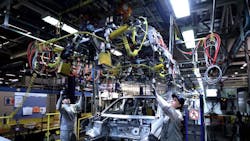Collaborative Robots in Automotive Manufacturing
Most of the collaborative robot applications we hear about are not in heavy industrial manufacturing. Recent examples of collaborative robot use that have been shared with us are in medical device manufacturing, injection molding and 3D printing—none of which would be considered as a heavy industrial manufacturing environment where caged or highly guarded robots tend to be more prevalent.
That’s what makes the news from PSA Group—manufacturer of Citroën, DS, Peugeot, Vauxhall and Opel cars—so interesting. As part of its “Excellent Plant” initiative aimed at increasing factory performance and reducing production costs, PSA Group is using Universal Robots’ UR10 in its new robotic assembly system.
According to PSA Group, the new robotic assembly system has improved worker ergonomics and reduced production costs by two to eight euros per car—which adds up to 400,000 to 1,600,000 euros in initial cost savings. The robotic assembly system using UR10s has also led to a 10 percent improvement in geometric dimensioning and tolerancing (a system for defining and communicating engineering tolerances) and has delivered what PSA Group refers to as “an excellent operational yield, with no failures reported in the first year with over 200,000 cars produced.”
“We chose the UR10 robot for its reach (1300 mm/51.2 inches), ease of programming and safety. But we’ve been extremely impressed with how quickly this initiative paid for itself,” said Cedric Grandjean, architect element specialist, finish assembly line at PSA Group. “Typically, when we implement new robots, we expect an initial loss in production that is made up over time, but that didn’t happen in this case. In fact, our return on investment has been between six months and one year, depending on the site where the robots are deployed.”
The new robotic assembly system was first deployed in PSA Group’s site in Sochaux, France, which manufactures 400,000 vehicles per year. The system was applied in what PSA Group calls a “unique collaborative screw-driving operation.” In this application, the UR10 robots are mounted on a moving platform that goes under the vehicle in production. Operators pull the vehicle into place and the robot performs the ergonomically challenging screw-driving operation under the vehicle while the workers perform other assembly tasks.
Universal Robots notes the UR10’s built-in safety mechanisms allow operators to work alongside the automated system without risk of injury.
PSA Group says its engineers were able to program all the robots in its new system for the Sochaux plant implementation in one month. Implementation of the entire system throughout the Sochaux site was completed in eight months. The success of the project has led PSA Group to file national and international patents for the entire application, including the integration of the UR10 robots. The company is currently deploying the system throughout its European plants in France, Spain and Slovakia.

